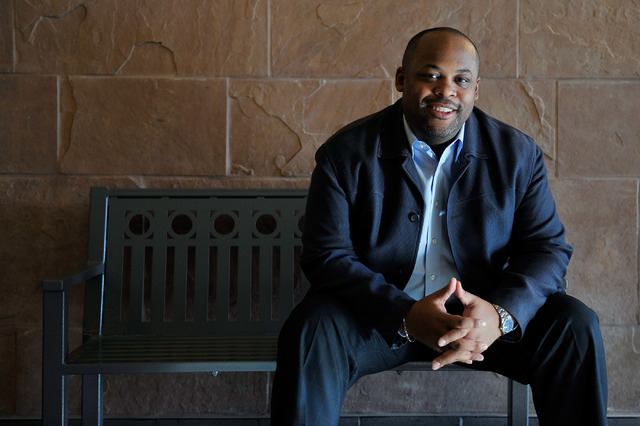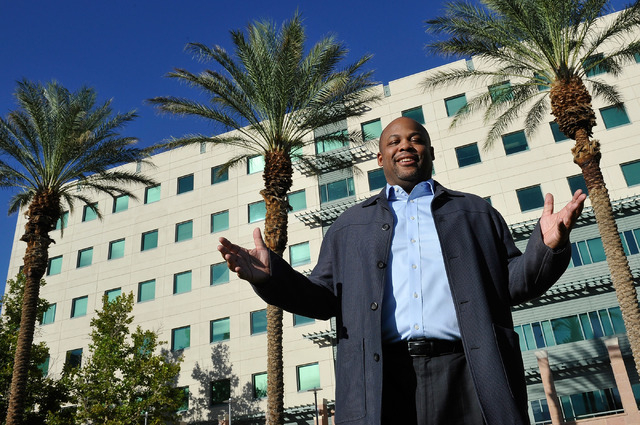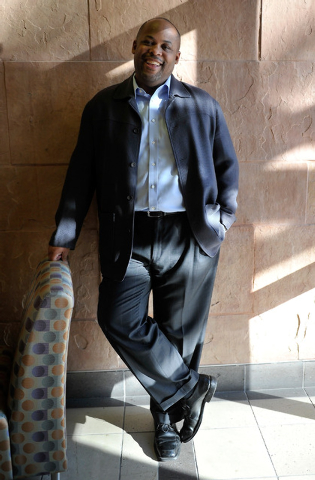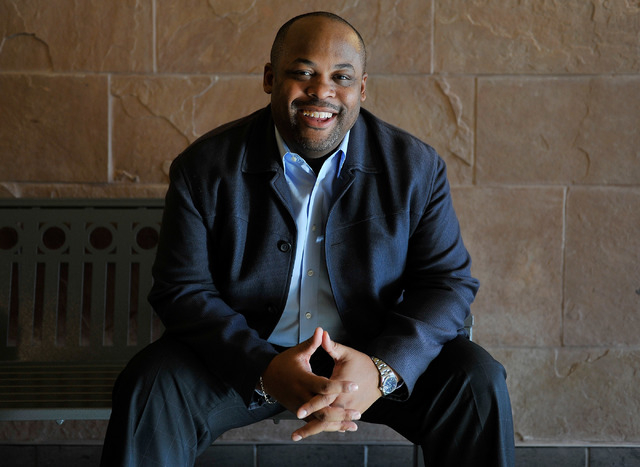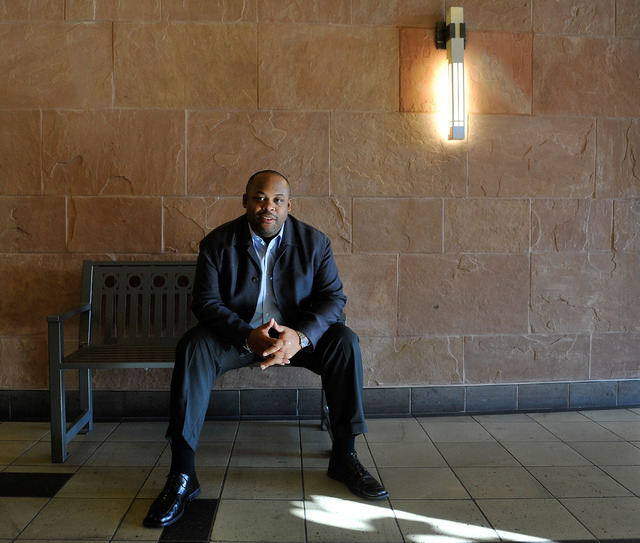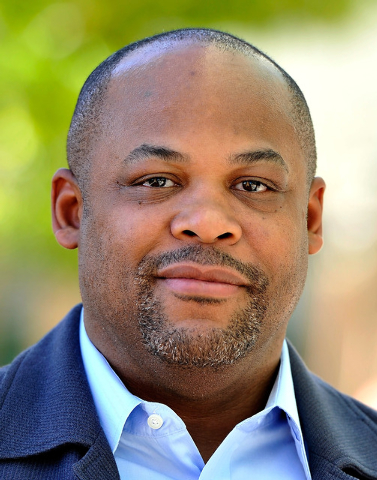Health care pro transforms from Las Vegas tourist into local
It took Vance Farrow nearly 20 years to transform from Las Vegas tourist into full-on local.
Farrow began visiting the city in the mid-1990s to see friends who lived here. He grew to love life off-Strip, so when the governor’s economic development office posted an opening in 2012 for an industry specialist to recruit new health care businesses and practitioners to the state, Farrow jumped at the opportunity.
It’s a definite change for Farrow, who spent most of his career in public health back East working on programs to prevent chronic disease, promote health programs and advance corporate-wellness initiatives. Today, Farrow focuses his big picture on boosting the number of health professionals in a chronically underserved state.
Question: What interested you in public health?
Answer: I grew up in a household that was very public-health focused. My father was a dentist, and he was always teaching somebody something about their health. That got instilled in me. I was also always good in math and science. I had a thirst for medicine, and public health seemed like a good fit. I also liked that it was pretty broad, so I could keep my hand in a lot of things. It’s not so finely focused that you could get bored.
Question: Why did you move into economic diversification?
Answer: It looked like a really good challenge. My focus was heavy on the public health and programming side. The economic development and diversification piece sounded like something I could really sink my teeth into. As someone who’s always looking for new places to stretch into, it looked like a good opportunity.
Question: You’re tasked partly with recruiting more doctors. Why is Nevada last in doctor-to-patient ratios in just about every specialty?
Answer: It’s pretty much a result of the standard growth-and-expansion model, where the city grew so fast that it lost the capacity to serve some of its residents. Because of that, there are a lot of gaps in service delivery, especially in health care.
Now that we have focused on expanding graduate medical education (doctors’ residencies), advanced practice nurses and the entire division of labor within health care, we’re going to see a lot of that curving in the appropriate direction.
There’s been steady growth in health care, even through the recession. It’s not a bubble field. It’s going to continue to grow, so we want an effective pipeline of folks to take those jobs. Those jobs pay fairly well, and the credentials are stackable. If you look at something like nursing or health information-technology, you see a lot of opportunities to stack and ladder that education and experience (into other fields). You also look at the average industry wage of $52,000, and it’s a no-brainer as to why a lot of people want to be in it.
Question: What do you do daily to help reverse the workforce shortage?
Answer: Part of it is traveling outside the state to talk to folks interested in relocating to Nevada and bringing jobs here. Another part is looking internally at organizations here and helping them with expansion. Some of them are looking to export globally or to expand, and they need assistance to do that. I also work closely with the state’s regional development authorities to help along those lines. And I work with stakeholders in economic development, including the Department of Employment, Training and Rehabilitation and the Nevada System of Higher Education. We all have a role to play, and we want to make sure we don’t overlap, because we don’t want to waste our efforts and the limited resources we have.
Question: What’s the biggest hurdle you face?
Answer: (Lack of) money is always an obstacle — a challenge you have to overcome. Oftentimes, you’re only dealing with so much, and you have to decide what to put where, what to cut from and what to add to. So it’s important to get it right with the best data you have.
Everybody I’ve worked with thus far has been very open and candid in what their interest is, and their interest in building collaborations. From that perspective, it’s been really good. A lot of folks have come out of the recession eager to partner, and people are starting to think outside the box. People were used to doing things their own way, and now that resources are scarce, it’s important to leverage that. The climate of collaboration is very good.
Question: What other signs of progress do you see?
Answer: I’ve spoken with boards that oversee licensure of health professions. I’ve talked to them about decreasing the time it takes to get people licensed to relocate people to Nevada. That’s been seen as very positive. The boards have been very receptive. They recognize the issue, and they’re actually stepping up to help make this a reality. We introduced legislation in the last session in 2013, but it timed out (when the session ended). We will reintroduce it in 2015, and hopefully it will sail through. The law will put a 60-day limit on how long it takes to get licensed here.
Also, the push for graduate medical education is promising. What we’re looking to do now is create criteria and evaluation metrics for selection programs. Hopefully, we’ll get that funded and begin programs that are ready to start growing. That will allow us to train and retain physicians from state institutions. With the wind at our backs, we’re looking to make positive changes in the numbers of doctors we’re able to graduate and retain. The future is bright, and the collaboration is there.
Question: What has been your biggest career accomplishment?
Answer: There is a nice, little program I’m working on with the Nevada System of Higher Education to create a community health worker curriculum. We’ll roll it out this fall. It’s a pilot program to train folks in chronic-disease management, and connect them to jobs. It’s grass-roots and very entry-level, but again, the skills are stackable, and can give people with an idea of entering health care a taste of the field, while at the same time certifying them to do entry-level things.
It’s going to be an eight- to nine-session curriculum on Saturdays. The partners are College of Southern Nevada and Truckee Meadows Community College. I’m really proud of our partners because this is something new and it didn’t really require twisting a lot of arms. A lot of folks really just get it. They understand that health care requires a diverse division of labor. When you’re trying to look at economies of scale, and trying to find ways to achieve quality access to health care at a reduced cost, you have to begin to look at who can do what at a cheaper rate, but still offer quality care. The (Centers for Disease Control and Prevention) has given their full backing to this.
A lot of states are picking up different aspects of the program, and we did this in Washington, D.C. People grabbed hold of it, and now we’re doing it here.
Question: What are your goals?
Answer: I would love to double the number of medical residents we have in Nevada, which is currently at about 550 active slots. That would be an awesome goal to accomplish. Also, I’d like to expand our infrastructure in telemedicine. We have the perfect atmosphere of rural and urban medicine that we can connect, and a growing broadband infrastructure. I’d like to see us take advantage of that, harness that potential and make Nevada a center for telemedicine.
Contact reporter Jennifer Robison at jrobison@reviewjournal.com. Follow @J_Robison1 on Twitter.
VITAL STATISTICS
Name: Vance Farrow
Position: Health care specialist, governor’s economic development office
Family: Single
Education: Bachelor of Science in microbiology and chemistry, Howard University; master’s degree in public health from the University of Michigan School of Public Health
Work history: Health services coordinator, Head Start; program manager, Michigan Neighborhood Partnership; chief of the Bureau of Cancer and Chronic Disease, District of Columbia Health Department; industry specialist for health care, governor’s economic development office.
Hobbies: Music and movies
Favorite book: "The Tipping Point" by Malcolm Gladwell
Hometown: Detroit
In Vegas since: 2012
The governor’s economic development office is at 555 E. Washington Ave. It can be reached at 702-486-2700.



